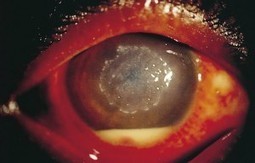Alejandra de-la-Torre,Arnaud Sauer,Alexander W. Pfaff,Tristan Bourcier, Julie Brunet,Claude Speeg-Schatz,Laurent Ballonzoli,Odile Villard,Daniel Ajzenberg,Natarajan Sundar,Michael E. Grigg,Jorge E. Gomez-Marin equal contributor,Ermanno Candolfi equal contributor mail
Research and publish the best content.
Get Started for FREE
Sign up with Facebook Sign up with X
I don't have a Facebook or a X account
Already have an account: Login
Latest advances in immunopathology diagnosis and treatment
Curated by
Alfredo Corell
 Your new post is loading... Your new post is loading...
 Your new post is loading... Your new post is loading...

Alfredo Corell's curator insight,
September 8, 2013 11:34 AM
Any sample (biopsies, brush or impresion cytologies, corneal scraping, vitreous or aqueus humour, ....) DIAGNOSTIC TESTS FOR: |
|















Ocular toxoplasmosis (OT), due to protozoan parasite Toxoplasma gondii, is a potential complication of both acquired and congenital infection, leading to visual impairment in numerous countries and being responsible for 30 to 50% of uveitis cases in immunocompetent individuals. In this study we confirmed the presence of more severe ocular toxoplasmosis in a tropical setting of Colombia, when compared to France. The main hypothesis for these clinical differences is based on the idea that severe disease in humans may result from poor host adaptation to neotropical zoonotic strains of T. gondii Indeed, our results are consistent with the hypothesis that South American strains may cause more severe OT due to an inhibition of the intraocular protective immune response.